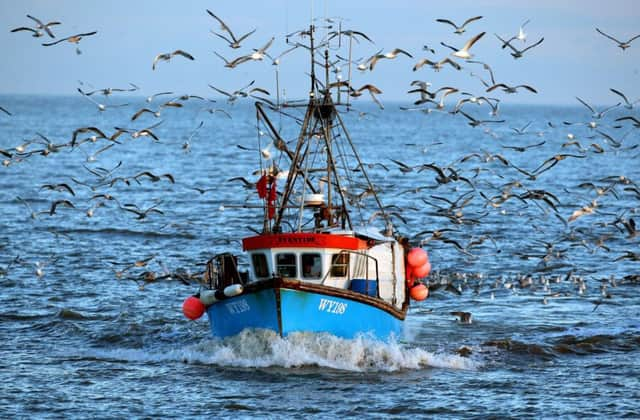Elections fail to be a fisherman’s friend


One down, one to go, at least as far as this cycle of general elections is concerned, and quite apart from the Scottish independence and EU in-out referendums. We’re not supposed to feel like that, not as citizens or as fishermen’s representatives, but there’s no getting away from it.
There would be a greater sense of excitement, and more point to questions from the media about what a possible change of government might mean, if UK and Scottish general elections made a real difference to what happens to us.
Advertisement
Hide AdAdvertisement
Hide AdLet me explain. Because it is hyper-regulated and managed by an unholy alliance of Brussels, London and Edinburgh, the fishing industry is well aware of the shortcomings of the political system as a whole. Or, to be more precise, the way choices are made.
Until this way of making choices changes, we are unlikely to be much impressed by the victory of one party rather than another at any election.
This is what government looks like to us. Politicians a very long way from the action have or adopt ideas that range from the sensible to the downright idiotic. Without an effective check from an emaciated, austerity-hit civil service, they reach out to “stakeholders” – often organisations with no “stake” at all, such as green activists funded by giant multinationals – who hand them ready-made proposals for new regulations and laws. Once these policies are enacted, the politicians turn to the people and communities most affected and say, “Here it is, we discussed this with stakeholders, it’s the law, get on with it or else”. And if the new rules turn out to be unworkable or completely daft, too bad.
Take the continuing saga of the “discard ban”, legislation voted by the European Parliament with the backing of both the Scottish and UK governments. The ban prohibits the return of unwanted fish to the sea, but has no problem with it being dumped in landfill. It confuses a worthy objective with what has to be done to tackle the cause of the problem, which is a disastrous quota system imposed by Brussels. It is like a ban on car accidents; nobody would quibble with the aim, but it’s all upside-down. Indeed, the new rules are so impractical that they could not be implemented as first intended without wrecking Scotland’s fishing communities.
So how did we get to that point? Well, none of the politicians asked us; we told them anyway, and they didn’t listen to that either. It wasn’t personal: if it doesn’t work, it doesn’t work. The thing is that when fisheries issues are raised in the corridors of power, nobody in them seems to think that a word with the people who actually know might be useful. It didn’t occur to UK or Scottish government ministers that communities, some engaged in commercial fishing operations for 1,000 years, might have some idea of how to deal with the discards problem. It was simply too much hassle to find out whether skippers in one of the most productive and healthy fisheries in Europe had anything to contribute. Perish the thought! It was evidently far easier to listen to celebrity chefs and environmental lobbyists living off dodgy corporate donations in Brussels.
Now for the really good part. The same governments that came up with the discard ban and supported unworkable rules written a world away from our fishing grounds are now finding that when it comes to implementation, the celebrity chefs and their green friends have made themselves scarce. Nowhere to be seen. So what happens when a fishing vessel catches fish nobody wants? Where do those fish go? Who pays for them to go there? Why can’t the seabirds, seals and dolphins have them? How do you catch small fish like haddock and simultaneously avoid bigger fish that are often caught with them, like hake?
Left in the lurch, the politicians are now coming to us. But it’s not a case of better late than never. They’re not saying they’re sorry, far from it. Instead it’s: “How do we make this thing work?” Or – I kid you not – it’s: “We can’t make this work, and don’t know how to. So it’s up to you.”
This carry-on beggars belief. It’s a shocking and irresponsible way to make policy, whether in fisheries or anywhere else. It is government on the cheap, shoddy work, and highly damaging to our most vulnerable communities. And as it appears to be the way all governments do things these days, making choices between parties is not nearly as interesting as it should be.
• Simon Collins is Executive officer of Shetland Fishermen’s Association www.shetlandfishermen.com